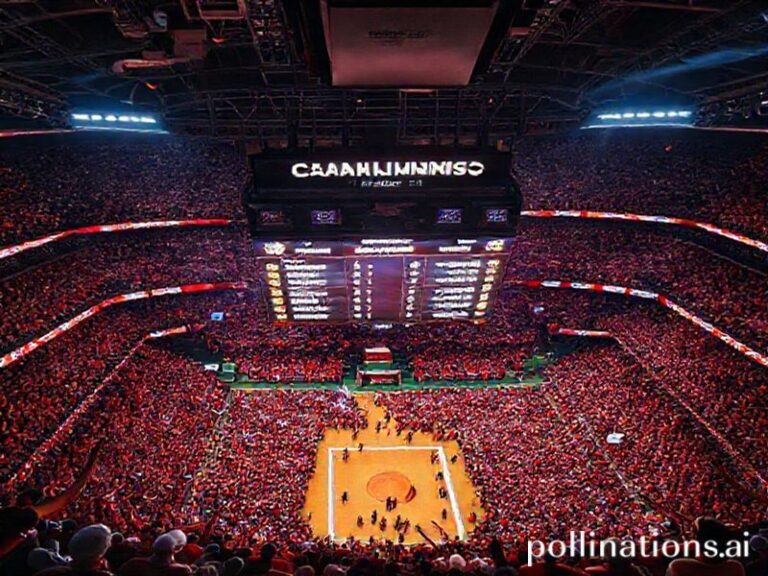Global FOMO: Why Tonight’s Mega Millions Drawing Has the Entire Planet Googling ‘Jackson Hole Real Estate’
Tonight, somewhere between the seventh re-watch of a Korean revenge thriller and the eighth doom-scroll through a European heat-wave montage, the Mega Millions drum will roll in Atlanta like a slot machine in purgatory. One-point-five-five billion dollars—give or take a rounding error that could bankroll the entire GDP of Vanuatu—will slosh from one plastic sphere to another while the planet holds its breath. Because, really, what’s a better symbol of our late-stage era than a globe-spanning prayer meeting conducted on behalf of a single American lottery ticket?
From Lagos to Lima, office pools have proliferated faster than crypto scams. In Manila, call-center agents are chipping in pesos they don’t have to chase dollars they’ll never see. A group of Syrian refugees in Berlin bought a single ticket using pooled cigarette money, reasoning that the odds of resettlement in Nebraska and the odds of matching six numbers are, statistically speaking, the same cosmic shrug. Meanwhile, in London, hedge-fund algos have already priced in the post-draw volatility of U.S. municipal bonds should the winner take the lump-sum and immediately attempt to corner the market on artisanal water futures.
The geopolitics of tonight’s drawing are deliciously perverse. The jackpot now rivals the annual defense budget of Finland; whoever wins could personally underwrite a NATO battlegroup or, if feeling whimsical, cancel all student debt for the state of Mississippi. China’s SAFE (State Administration of Foreign Exchange) is rumored to have contingency plans should the winner try to wire the cash abroad—Beijing fears an American civilian accidentally weaponizing liquidity. The European Central Bank, still nursing a hangover from negative interest rates, quietly hopes the winner parks the haul in Frankfurt overnight deposits, if only to prove demand for euros still exists.
International development NGOs, ever the buzzkills, point out that $1.55 billion could vaccinate half the Sahel and still leave enough to bribe every customs officer from Dakar to Djibouti. Yet they know the winner will more likely erect a 12-bedroom panic bunker in Jackson Hole and install a panic button that summons a private firefighting squad during climate-change infernos—an American twist on feudalism with better Wi-Fi.
The moral mathematics have gone viral across WhatsApp groups in four languages. A meme circulating in Bogotá calculates that the jackpot equals 3,875 lifetimes of the average Colombian minimum-wage worker, accompanied by a laughing-crying emoji that has never been more ambiguous. In Mumbai, an influencer live-streamed the purchase of 500 tickets, promising to donate half his hypothetical winnings to “the slums.” Viewership spiked in Bangladesh, where the per-capita GDP is roughly one lottery ticket. The algorithm, ever charitable, served him an ad for offshore wealth management.
Of course, the true winners are not the ticket-holders but the ecosystems orbiting them. The state of California alone will skim roughly $120 million for public schools, enough to keep the lights on in Los Angeles Unified for a fiscal quarter—assuming the lights aren’t shot out in the celebratory gunfire. International broadcasters have pre-written templates: “[Insert Country] Man/Woman/Consortium Claims Record Jackpot,” ready to auto-populate like Mad Libs for late capitalism.
When the numbers drop tonight—somewhere between 11 p.m. EDT and your third existential crisis—the world will fracture into two camps: those who won and those who can now resume pretending that compound interest is a retirement plan. The winner will be offered citizenship by at least three Caribbean nations before breakfast tomorrow, because nothing says “economic diversification” like a freshly minted billionaire looking for a flag of convenience.
And yet, beneath the cynicism lies a grudging respect for the sheer scale of human optimism. In an age of melting ice caps and rising autocrats, we still collectively agree to hallucinate a better tomorrow via numbered ping-pong balls. It’s not hope, exactly; it’s more like a global inside joke we’re all too tired to stop telling. So good luck, dear ticket-holder. If you win, remember to tip the barista in whatever currency survives the next decade.







